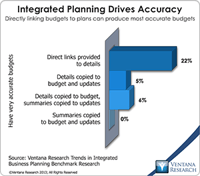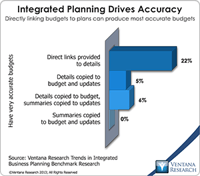Business planning is a new software category. These applications enable senior executives to integrate all the plans of business units into a single, integrated view, which helps them have more accurate plans, do more insightful what-if planning, achieve greater agility in reacting to changing business and economic conditions, and execute plans in a more coordinated fashion than was possible. Business planning software is intended for CEOs and COOs, who are not well served by current...
Read More
Topics:
Big Data,
Performance Management,
Planning,
Predictive Analytics,
Office of Finance,
Operational Performance Management (OPM),
Reporting,
Budgeting,
Controller,
Business Analytics,
Business Collaboration,
Cloud Computing,
In-memory,
Business Performance Management (BPM),
CFO,
Workforce Performance Management (WPM),
Financial Performance Management,
financial reporting,
FPM,
Integrated Business Planning
Oracle continues to enrich the capabilities of its Hyperion suite of applications that support the finance function, but I wonder if that will be enough to sustain its market share and new generation of expectations. At the recent Oracle OpenWorld these new features were on display, and spokespeople described how the company will be transitioning its software to cloud deployment. Our 2013 Financial Performance Management Value (FPM) Index rates Oracle Hyperion a Warm vendor in my analysis,...
Read More
Topics:
Big Data,
Mobile,
Planning,
Social Media,
ERP,
Human Capital Management,
Modeling,
Office of Finance,
Reporting,
Budgeting,
close,
closing,
Consolidation,
Controller,
driver-based,
Finance Financial Applications Financial Close,
Hyperion,
IFRS,
Tax,
XBRL,
Analytics,
Business Analytics,
Business Intelligence,
CIO,
Cloud Computing,
In-memory,
Oracle,
Business Performance Management (BPM),
CFO,
compliance,
Data,
Financial Performance Management (FPM),
benchmark,
Financial Performance Management,
financial reporting,
FPM,
GAAP,
Integrated Business Planning,
Price Optimization,
Profitability,
SEC Software
Business planning as practiced today is a relic, a process hemmed in by obsolete conceptions of what it should be. I use the term “business planning” to encompass all of the forward-looking activities in which companies routinely engage, including, for example, sales, production and head-count planning as well as budgeting. Companies need to take a fresh view of all these, adopting a new approach to business planning that while preserving continuity makes a substantial departure from what most...
Read More
Topics:
Big Data,
Planning,
Predictive Analytics,
Social Media,
Office of Finance,
Operational Performance Management (OPM),
Reporting,
Budgeting,
Controller,
In-memory,
Business Performance Management (BPM),
CFO,
Financial Performance Management (FPM),
Supply Chain Performance Management (SCPM),
Financial Performance Management,
financial reporting,
FPM,
Integrated Business Planning
Read More
Topics:
Mobile,
Predictive Analytics,
Real-time,
SAP,
ERP,
Operational Performance Management (OPM),
Analytics,
Business Analytics,
Business Collaboration,
Cloud Computing,
In-memory,
Business Performance Management (BPM),
CRM,
Customer Performance Management (CPM),
finance,
Financial Performance Management (FPM),
Sales Performance Management (SPM),
Supply Chain Performance Management (SCPM),
Workforce Performance Management (WPM),
Social,
Business Suite,
Financial Performance Management,
HANA
Businesses always see a lag between when technology makes some advance possible and when a majority of companies actually adopt it. There’s even a longer lag between the emergence of an advance in a business process or technique and the time it takes to become mainstream. When we write our research agendas at the top of each year, we have to strike a balance between focusing on the new and different, which is still many years away from general acceptance, and the mainstream, which has been...
Read More
Topics:
Big Data,
Planning,
Predictive Analytics,
Governance,
GRC,
Office of Finance,
Operational Performance Management (OPM),
Budgeting,
close,
Analytics,
Business Analytics,
Business Collaboration,
CIO,
Cloud Computing,
In-memory,
Business Performance Management (BPM),
CFO,
Financial Performance Management (FPM),
Risk,
Sales Performance Management (SPM),
Workforce Performance Management (WPM),
CEO,
Financial Performance Management,
FPM
I recently started a series of blog posts on what CEOs (and for that matter, all senior corporate executives) need to know about IT. The first covered the high-level issues. As I noted there, it’s not necessary for a CEO of a company to be able to write Java code or master the intricacies of an ERP or sales compensation application. However, CEOs must grasp the basics of IT just as they must understand basic corporate finance, the production process and – at least at a high level – the...
Read More
Topics:
Big Data,
Mobile,
SaaS,
Social Media,
Customer,
ERP,
Operational Performance Management (OPM),
Business Analytics,
Business Collaboration,
Cloud Computing,
Complex Event Processing,
In-memory,
Business Performance Management (BPM),
CFO,
Customer Performance Management (CPM),
Financial Performance Management (FPM),
Information Management (IM),
Sales Performance Management (SPM),
Supply Chain Performance Management (SCPM),
Workforce Performance Management (WPM),
CEO,
PaaS
The business/IT divide is a barrier that prevents most companies from achieving their true performance potential. The divide has remained a constant impediment since the dawn of business computing six decades ago. It’s not necessary for a CEO of a company to be able to write Java code or master the intricacies of an ERP or sales compensation application. However, that CEO must master the basics of IT just as he must understand basic corporate finance, the production process and – at least at a...
Read More
Topics:
Big Data,
Performance Management,
Human Capital Management,
Operational Performance Management (OPM),
competition,
executive,
CIO,
Cloud Computing,
In-memory,
Business Performance Management (BPM),
CFO,
Customer Performance Management (CPM),
IT,
Sales Performance Management (SPM),
Supply Chain Performance Management (SCPM),
Workforce Performance Management (WPM),
CEO,
FPM
For the past several years Ventana Research has focused more on analytics and their importance to improving business performance. We’ve done extensive benchmark research in business analytics, detailing how they are used generally in business and in major functional areas of companies as well as their application in specific industries. We adopted this focus because technology advances are changing the landscape of analytics. Its use in business management, for example, is getting new scrutiny...
Read More
Topics:
Big Data,
Performance Management,
Planning,
Human Capital Management,
Modeling,
Office of Finance,
Operational Performance Management (OPM),
Budgeting,
driver-based,
Analytics,
Business Analytics,
In-memory,
Business Performance Management (BPM),
Customer Performance Management (CPM),
Financial Performance Management (FPM),
Sales Performance Management (SPM),
Supply Chain Performance Management (SCPM),
Workforce Performance Management (WPM),
best pracices,
business value,
cash management,
challenge,
financial planning
For me, the most significant announcement to come out of the recent SAPinsider conference was the company’s formal release of Business Planning and Consolidation (BPC) running on HANA, SAP’s in-memory computing appliance. For me, HANA is a potential “game changer” for planning, statutory consolidation and other analytics-supported financial processes because of the substantial reduction it enables in processing time from loading to reporting. In-memory systems provide a substantial edge in...
Read More
Topics:
Big Data,
Mobile,
Planning,
SAP,
Social Media,
Customer Experience,
ERP,
GRC,
Office of Finance,
Operational Performance Management (OPM),
Budgeting,
IFRS,
XBRL,
Analytics,
Business Analytics,
Business Collaboration,
Business Mobility,
Cloud Computing,
In-memory,
Business Performance Management (BPM),
finance,
Financial Performance Management (FPM),
Sales Performance Management (SPM),
Supply Chain Performance Management (SCPM),
Workforce Performance Management (WPM),
Financial Performance Management,
GAAP,
HANA
One trend in business software that’s still in its early stages but gathering momentum is the availability of modeling tools that fill the gap between desktop spreadsheets and enterprise systems. Granted this “early stage” has been under way for quite some time, but the technology has finally progressed to the point where I expect it to get increasing market traction.
Read More
Topics:
Big Data,
Database,
Planning,
Forecast,
Office of Finance,
Operational Performance Management (OPM),
Essbase,
Quantrix,
Analytics,
Business Analytics,
Business Collaboration,
Business Intelligence,
In-memory,
Business Performance Management (BPM),
finance,
Financial Performance Management (FPM),
Sales Performance Management (SPM),
Workforce Performance Management (WPM),
analysis,
analytical application,
business model,
business plan,
financial model














